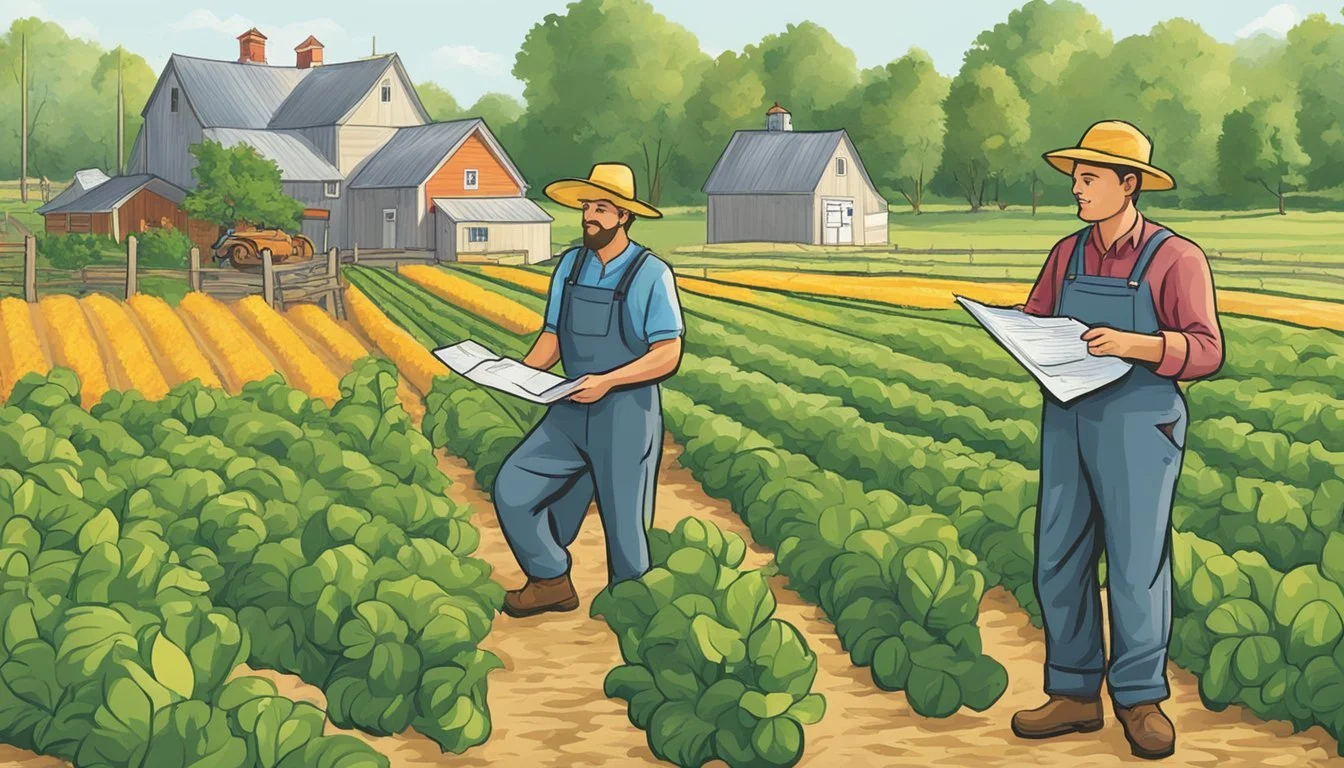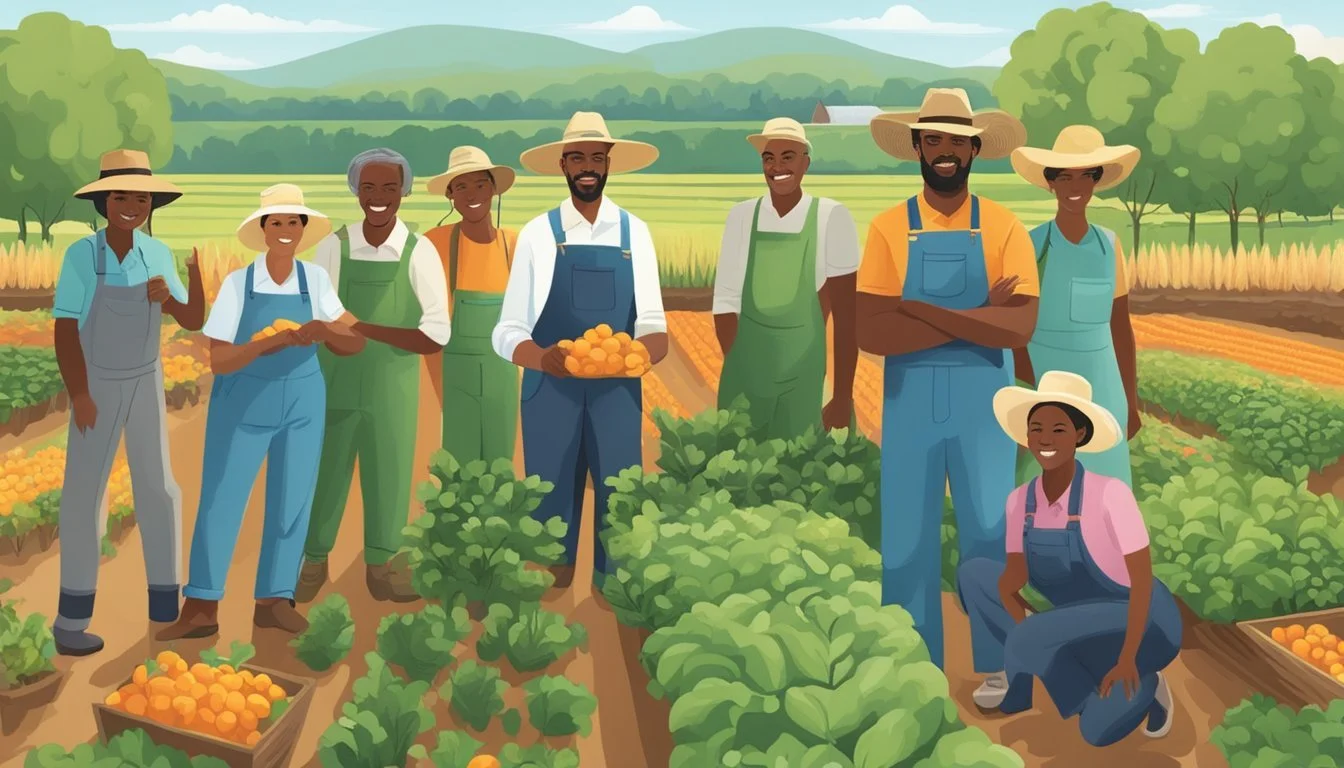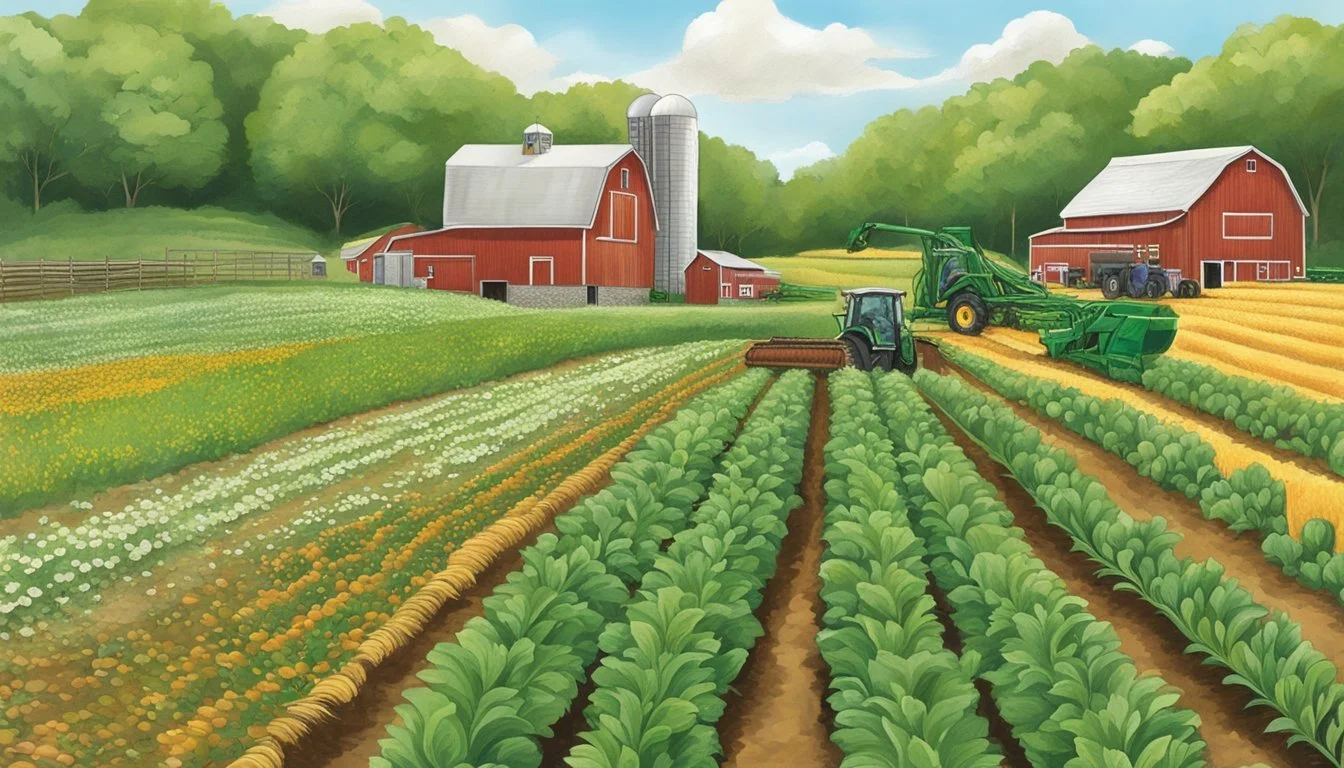Farming Grants Connecticut
Navigating Financial Support for Local Agriculture
Connecticut's farming community has various opportunities for financial assistance through grants aimed at enhancing the state's agricultural viability. Recognizing the importance of agriculture to the region's economy and heritage, the Connecticut Department of Agriculture (DoAg) extends support to local farmers and agricultural businesses. This commitment manifests in the form of grant programs tailored to foster growth, innovation, and sustainability within the farming sector.
Among the initiatives available are the Farm Transition Grant, which enables farmers and agricultural cooperatives to diversify their operations, transition to value-added production, and explore new market opportunities. This grant underscores the state's proactive stance on agricultural development, adapting to changes and ensuring the longevity of farming enterprises. Furthermore, additional grant programs such as the Farmland Restoration Grant and the Organic Certification Cost Share Program reflect Connecticut's broader strategy to encourage sustainable farming practices and support organic agriculture.
With a focus on strength and adaptability, these grants collectively aim to equip Connecticut's agricultural community with the resources needed to thrive. The state's approach reflects an understanding of the critical role that farming plays in local food systems, economic development, and environmental stewardship. The varied funding opportunities are a testament to Connecticut's dedication to maintaining a robust and dynamic agricultural sector.
Understanding Farming Grants in Connecticut
In Connecticut, the Department of Agriculture offers various grants to support the state's agricultural sector. These grants aim to enhance the economic viability of agricultural businesses during periods of growth and change.
Overview of Connecticut Farming Grants
The Connecticut Department of Agriculture (CT DoAg) provides grants that are crucial for the development of the agricultural industry within the state. Such grants assist in transitioning existing farms into more diversified and sustainable operations, reflecting strategic revisions based on feedback from local agricultural producers.
Eligibility Criteria for Applicants
Eligibility for these grants is usually specific and could include:
Connecticut farmers and agricultural cooperatives.
Municipalities, groups of municipalities, regional councils of government, and/or agricultural non-profit organizations.
Applicants must align with the objectives of the grant program, which typically focuses on economic viability and sustainability of Connecticut's agriculture.
Types of Farming Grants Available
Connecticut offers several types of farming grants, including:
Farm Transition Grants: For diversification, value-added agriculture, and sales emphasizing on locally grown products.
Agricultural Enhancement Grants: Accessible to eligible municipalities and organizations for projects that directly advance the state's agricultural sector.
These grants are intended to provide financial support and encourage farmers to innovate and adapt to evolving market demands and environmental challenges.
Key Farming Grant Programs
Connecticut's farming landscape benefits significantly from various grant programs designed to boost agricultural ventures and innovations. These key programs offer financial support for farmers and agricultural cooperatives intent on transitioning, expanding, or improving their operations.
Farm Transition Grant Program
The Farm Transition Grant Program aids established farmers and agricultural cooperatives in Connecticut. It is a competitive matching grant focused on diversifying farm operations and transitioning to value-added agricultural production. The grant supports venues where the majority of products sold are grown in-state, promoting local agriculture.
Infrastructure Investment Grant Program
While specific details about the Infrastructure Investment Grant Program are not provided in the search results, it can be inferred that, like many similar initiatives, it likely offers financial aid for building or upgrading physical agricultural infrastructure. Such programs typically aim to enhance production efficacy and market delivery.
Research and Development Grant Program
The Research and Development Grant Program might include funding for various agricultural research projects and the development of innovative farming techniques. Grants like these usually serve to support studies that can improve crop yields, pest control, and overall farm sustainability and efficiency.
Innovation and Diversification Grant Program
Finally, the Innovation and Diversification Grant Program is likely to be aligned with supporting farmers exploring novel crops or farming methods and branching out into non-traditional agricultural ventures. These grants often aim to increase resilience and profitability in a competitive and challenging agricultural marketplace.
Each program addresses different needs within the farming community and together, they form a comprehensive suite of resources to help Connecticut's agriculture thrive.
Grant Application Process
The grant application process for Connecticut's farming grants is a vital step for securing financial assistance. Detailed attention to the preparation, comprehension of the required forms, and adherence to submission guidelines are fundamental to successful grant approval.
Preparing Your Application
An applicant should start by thoroughly reading the guidelines provided for the grant, ensuring they understand the objectives and criteria. The initial step involves gathering all necessary information, which typically includes a detailed project description, a budget, and evidence of matching funds if required. Any supporting documents such as business plans and agricultural qualifications should be compiled in advance.
Key Documents to Gather:
Project proposal and timeline
Detailed budget breakdown
Proof of matching funds (if applicable)
Understanding Forms and Procedures
Connecticut’s Department of Agriculture requires specific forms for each grant application. They are usually downloadable from the CT.gov website. As seen in the search results, agricultural enhancement grant applications mandate submission by a deadline—February 16, 2024, at 4:00 p.m. for the year mentioned. Late submissions will not be considered, so understanding the form's sections and requirements is essential.
Important Form Components:
Applicant information (name, address, contact)
Farm description (size, type of agriculture, etc.)
Detailed project description and purpose
Grant Submission and Review
After completing the application and following all procedures, the applicant must submit their form before the stated deadline. For the Farm Transition Grant, it was highlighted that only complete applications that adhere to the guidelines are entered into the competitive review process.
Submission Notes:
Verify for accuracy and completeness
Adhere strictly to submission deadline
Await the review process, which may involve a committee evaluation
Understanding the rigorous nature of the application process is essential for successful grant acquisition. The application should reflect the farm's potential for growth and adherence to Connecticut's agricultural objectives.
Supporting Connecticut Farmers
Connecticut is committed to bolstering its agricultural sector through a variety of support mechanisms, primarily focusing on financial assistance, enhancing farmer know-how, and boosting the marketing and sales capabilities of its farming community.
Financial Resources for Farmers
Farmers in Connecticut have access to financial support that aids in diversifying and strengthening their operations. Notably, the Farm Transition Grant (FTG) provides monetary aid to farmers and agricultural cooperatives looking to diversify and enhance their operations. The program specifically targets projects that transition to value-added agricultural production and increase the sales of products grown within the state. Eligible recipients for these grants include individual farmers, agricultural cooperatives, and in some cases, nonprofit organizations working in the agricultural sector.
Grant Types Available:
Diversification of farm operations
Value-added production transitioning
Infrastructure improvement projects
Training and Development Opportunities
To ensure longevity and sustainability, Connecticut offers training and development programs focused on equipping farmers with the necessary skills for modern agriculture. These opportunities are designed to address sustainable farming practices and animal welfare, among other key areas. Often provided through state agencies or agricultural organizations, these trainings include seminars, workshops, and online courses.
Key Training Areas:
Sustainable farming techniques
Animal welfare
Climate-smart agriculture practices
Marketing and Sales Support
Marketing savvy and sales acumen are critical for the success of local farmers, and Connecticut recognizes this by rendering assistance in these areas. The state fosters environments where the majority of products sold are locally grown, thereby supporting farmers' marketability. Programs and initiatives help connect farmers with consumers and local food systems, underlining the importance of product marketing.
Support Mechanisms:
Establishment of farmers' markets
Promotion of 'buy local' food programs
Development of direct-to-consumer sales channels
Advancing Agricultural Practices
The state of Connecticut actively supports the enhancement of agricultural practices through various grant programs aimed at fostering sustainability, research, and innovation within the farming sector.
Sustainable Farming and Conservation
Connecticut’s commitment to sustainable farming and conservation is evident in programs like the Farm Transition Grant (FTG), which allocates funds to farmers and agricultural cooperatives. These grants are specifically designed to assist in the diversification of farm operations and the transition to value-added agricultural production, which emphasizes the conservation of resources and the establishment of sustainable practices.
Objective: Diversification and sustainable transition of farm operations.
Beneficiaries: Connecticut farmers and agricultural cooperatives.
Research in Agriculture and Food System
The Agriculture Enhancement Grant Program demonstrates Connecticut’s investment in research related to its food system. This initiative provides grants for projects that lead to enhanced agricultural practices and food system improvements. By funding research, the state supports the betterment of agricultural productivity and sustainability, contributing to a robust food system.
Application Deadline: February 16th, 2024.
Technological Innovation in Farming
To remain at the forefront of the agricultural sector, investments in technological innovation in farming are also a priority. Grant programs in Connecticut not only support traditional farming methods but also encourage farmers to adopt modern technologies. These advancements are crucial for improving efficiency, increasing yield, and ensuring long-term sustainability of the agriculture industry.
Focus: Efficiency, increased yield, and long-term sustainability.
Approach: Adoption and integration of modern technological advancements in farming practices.
Fostering Diversity and Inclusion
Connecticut's agricultural grants are designed with a strong emphasis on enhancing diversity and inclusion within the farming community. These initiatives specifically aim to support BIPOC and veteran farmers, promote social justice through agriculture, and aid organic and small-scale agricultural enterprises.
Grants for BIPOC and Veteran Farmers
Connecticut recognizes the importance of supporting BIPOC (Black, Indigenous, and People of Color) and veteran farmers through targeted grant programs. These grants provide financial aid to help bridge the gap and offer opportunities for these groups to establish and expand their agricultural businesses. Initiatives such as the Agricultural Enhancement Grant aim to increase their representation and success in the agricultural sector.
Eligibility: Must be BIPOC or a veteran farmer
Support: Funds may cover a variety of costs like equipment, infrastructure, training, and more
Promoting Social Justice through Agriculture
The state is committed to promoting social justice within its agricultural framework. This includes ensuring equitable access to resources and support for all farmers, regardless of their background. By addressing systemic barriers and creating fair opportunities, the grants play a pivotal role in cultivating a more inclusive farming environment.
Objectives:
Equitable distribution of resources
Elimination of barriers to entry and growth in agriculture
Supporting Organic and Small-Scale Farmers
Organic and small-scale farmers often face unique challenges that larger agricultural operations do not. Connecticut's grant programs consider these factors and provide essential support to help maintain and enhance organic farming practices and sustain small-scale farming businesses. This support not only benefits the farmers but also contributes to sustainable agricultural practices statewide.
Focus Areas:
Encouraging sustainable and eco-friendly farming methods
Providing financial assistance to small-scale farmers to improve viability
Note: All grants are contingent upon meeting specific requirements set forth by the Connecticut Department of Agriculture and may be subject to change.
Resource Allocation and Management
Effective resource allocation and management are crucial for sustainable agricultural growth and efficient response to emergencies. These strategies help farmers optimize their financial and natural resources while preparing for unforeseen events.
Budgeting for Agricultural Growth
Farmers must approach budgeting with strategic planning to ensure long-term viability and growth. Financial resources, particularly from grants, allow for diversification and advancement in value-added production. For example, the Connecticut Department of Agriculture (CT DoAg) actively provides Farm Transition Grants, with application deadlines and guidelines strictly adhered to. Funding from grants like these should be allocated to areas within operations that promise a tangible increase in productivity and profitability.
Key Expenditures for Growth:
Equipment upgrades
Infrastructure improvements
Research and development
Training and education
Optimizing Use of Natural Resources
Sustainable management of natural resources is of paramount importance for long-term agricultural success. Programs like the Agricultural Enhancement Grant encourage best practices that lead to enhanced stewardship of land and water resources. This includes initiatives supported by the Natural Resources Conservation Service (NRCS) which offers expertise and funding support for conservation projects.
Areas of Focus for Natural Resource Optimization:
Soil health improvement
Water conservation techniques
Integrated pest management
Emergency Assistance and Disaster Preparedness
Agricultural entities need robust plans for emergency assistance and disaster preparedness to minimize the impact of adverse events. Through grants and support services, farmers can access resources necessary for developing emergency response strategies. The Farmland Restoration Grant, for instance, is available for agricultural producers to rehabilitate farmland damaged by natural disasters, contributing to a state of readiness and resource resilience.
Essential Components of Emergency Preparedness:
Risk assessment plans
Response strategy development
Recovery fund allocation
Emergency training sessions
Strengthening Connecticut's Economy
Agriculture in Connecticut functions not merely as a food source but as a pillar of local economy enhancement and a bastion of cultural heritage, enticing visitors through agricultural tourism.
Impact of Farming on State's Economy
Agriculture in Connecticut is a vital contributor to the state's economy. It provides significant employment opportunities and contributes to the gross domestic product (GDP). The Connecticut Department of Agriculture's Farm Transition Grant (FTG) and Agricultural Enhancement Grant programs underpin this economic sector by offering financial assistance aimed at diversifying and augmenting agricultural businesses.
Employment: The sector creates jobs, not only on farms but also in related industries such as food processing and agricultural supply chains.
Financial Impact: Grants from these programs often lead to improved production efficiency and increased sales for agricultural cooperatives and producers.
Agricultural Contributions to Cultural Heritage
Historically, Connecticut's agriculture has shaped much of the state's cultural heritage. The state acknowledges the deep-rooted connections between its residents and the land they cultivate. Through grants and support, Connecticut ensures the preservation of traditional farming methods while encouraging modern, sustainable practices.
Traditions Preserved: Family-owned farms and agricultural cooperatives are often custodians of the state's agrarian traditions.
Modern Practices: Assistance from state programs allows these entities to embrace value-added production, therefore preserving heritage while innovating for future viability.
Encouraging Agricultural Related Tourism
Tourism flourishes when connected to agriculture through venues like farmers' markets and agri-tourism operations. Connecticut uses grants to enhance these attractions and bolster the state's appeal as a destination for agricultural tourism.
Destinations and Events: Farmers' markets, farm-to-table events, and pick-your-own fruit farms draw visitors and residents alike.
Economic Boost: This form of tourism stimulates local economies by circulating dollars within the community and creating a market for locally produced goods.
Navigating Federal and State Support
Farmers in Connecticut can leverage a variety of federal and state support programs designed to foster agricultural development and sustainability. By understanding the programs offered, farmers are able to find significant funding opportunities and a wealth of resources tailored to enhance farm operations.
Understanding USDA Programs
Federal Support through the United States Department of Agriculture (USDA) encompasses a broad range of programs aimed at aiding farmers. Some key initiatives include:
Conservation Programs: Offered by the USDA's Natural Resources Conservation Service, these provide technical and financial support to improve environmental quality on farms.
Farm Loan Programs: Designed to provide farmers with access to necessary capital, covering everything from land purchase to operational costs.
The USDA also provides confidential assistance to farmers to help navigate through the variety of programs and understand the requisites for eligibility.
State-Level Funding and Support
The state of Connecticut actively supports its agricultural sector through initiatives such as the 2024 Agricultural Enhancement Grant Program. This offers financial aid for:
Projects that direct market Connecticut grown agricultural products.
Diversification and transitioning to value-added operations.
The Farm Transition Grant, a staple of State Support, is a matching grant program catering to operational diversification and introducing value-added agricultural production.
Collaboration between Government Agencies
Successful agricultural enhancement efforts in Connecticut often involve collaboration between federal and state agencies. For instance, the Connecticut Department of Agriculture (DoAg) works closely with federal entities like the USDA to streamline support services. They provide farmers with:
Access to information on both federal and state funding.
Guidelines and application assistance for various programs.
Integrated support systems by linking USDA resources with state-provided opportunities.
Understanding how these agencies interlink can be paramount for farmers looking to maximize the benefits received from both levels of government.







